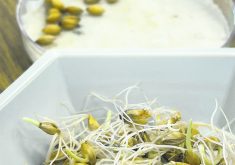The Canadian Grain Commission has been cross-checking and testing samples sent in by producers and seed growers
It’s a busy time of year for seed laboratories as the 2023 planting draws near.
This year, labs will likely see their resources pressured because the malt barley industry plans an extensive testing program to sort out contamination in the seed stock.
Peter Watts, managing director of the Canadian Malting Barley Technical Centre, said the industry saw problems last year when samples from a few of the older varieties, including Metcalfe and Copeland failed to meet purity standards.
Copeland is the most commonly grown malt barley variety.
Read Also

Saskatchewan puts crown land auction on hold
Auctions of Saskatchewan crown lease land are once again on hold.
“The grain companies were seeing a higher number of samples and average that did not meet the 95 percent minimum varietal purity that they required in their contracts. And that’s because they guarantee 95 percent purity in their contracts for export sales,” Watts said.
“We saw it again this year. There were quite a number of samples, and again Copeland was the variety that seemed to have the most issues. We don’t have a lot of information because we’re trying to figure out what was going on there.”
He said the Canadian Grain Commission has been cross-checking and testing samples, and the CMBTC has arranged for lots of samples of Copeland and other varieties to be sent in from producers and seed growers.
The CGC uses a DNA PCR test, which is extremely accurate, however the test takes time and there are capacity issues, especially considering the number of tests required this year.
Doug Munro is a merchandising manager for Boortmalt, which produces and sells barley malts for breweries and distilleries around the world.
Munro said during the Feb. 23 Top Crop Summit in Saskatoon that there is a purity problem with some malt barley varieties in some areas.
“Some of the newer varieties, maybe what the seed companies have are not the right markers. With Copeland, because it’s an older variety, there could just be, they call it variance. I don’t know, if something is a variant of Copeland is it still Copeland? I don’t know, I don’t want to go down that rabbit hole,” Munro said.
He said China is the big market for Canada’s malt barley, and it is sensitive to purity specifications and herbicide maximum residue limits.
“That is huge for Viterra and Richardson. Their customers need reassurance that what they’re buying, what they pay for is that. So, we have to solve this,” Munro said.
“It’s something we’re working on that will be solved for next year. Don’t be surprised if there is going to be a lot more testing.”
He said China pays a premium to Canadian grain companies for malt barley with a high degree of purity because it is beneficial for brewing processes in the country.
Watts said when a new malt barley is developed, it is common for there to be a slight variant within the seed that can cause problems over time.
“Maybe one seed in 100 doesn’t exactly match the DNA profile of the other 99. So that when you do these DNA PCR tests you might have, say it’s Copeland, you have this variant that is technically Copeland, but it has a slightly different DNA profile,” Watts said.
“The theory is that maybe, over time, that variant of Copeland has propagated so that now instead of one percent it’s five percent (of total crop volume). So that’s why it’s leading to these tests that are failing.”
He said there is a benefit for malt barley growers to grow multiple varieties the same year, however keeping records of where everything is stored is important to make sure different varieties are not accidentally mixed or mislabelled.
“We put quite a bit of effort into giving the background and why (grain purity) is important, and to give some guidelines to producers and encourage producers to purchase certified seed regularly. It doesn’t have to be every year, but every couple of years. That’s how you can help ensure purity.”


















